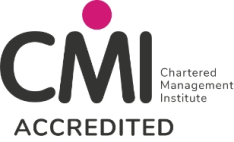 To help and support our clients we are providing a limited number of 250 daily discount codes. Hurry, first come, first served!
To help and support our clients we are providing a limited number of 250 daily discount codes. Hurry, first come, first served!
CMI Level 4 FAQs
CMI Level 4 is a qualification designed for aspiring and mid-level managers, focusing on leadership, team management, and operational planning to enhance managerial effectiveness and career progression.
CMI courses are highly valuable for professionals seeking to enhance leadership skills, improve career prospects, and gain recognised management qualifications that demonstrate competence and credibility in the workplace.
A CMI Level 4 qualification is equivalent to the first year of an undergraduate degree or an HNC, providing a solid foundation in management and leadership principles for aspiring and mid-level managers.
The CMI Level 4 qualification is designed for aspiring and mid-level managers looking to develop leadership skills, enhance team management capabilities, and improve operational efficiency to advance their careers.
The training develops leadership, team management, decision-making, operational planning, problem-solving, and communication skills, equipping managers with the competencies needed for effective organisational leadership and career growth.
The certification aims to enhance leadership and management skills, improve decision-making, and equip professionals with the knowledge to lead teams effectively and drive organisational success.
These training courses enhances leadership skills, improves career prospects, boosts confidence in decision-making, and provides a recognised qualification that demonstrates managerial competence and supports professional growth.
The prerequisites for these courses are based on the course specifications and the target group of professionals it serves. Check the respective course page of the course that you are planning to take to know about its prerequisites.
The course is designed to be accessible to all levels, making it suitable for both beginners and experienced professionals. It covers foundational concepts while offering in-depth insights into personal and organisational growth strategies.
These courses are ideal for aspiring and mid-level managers seeking to enhance leadership skills, improve team management, and develop strategic decision-making abilities to advance their careers.
Holding this Level 4 Certification demonstrates managerial competence, enhances career prospects, and validates leadership skills, equipping professionals with the expertise to effectively manage teams and drive organisational success.
In this training course, delegates will have intensive training with our experienced instructors, a digital delegate pack consisting of important notes related to this course, and a certificate after course completion.
This training covers leadership principles, team management, operational planning, decision-making, problem-solving, communication strategies, performance management, and organisational change to enhance managerial effectiveness and career development.
CMI Level 4 Certification courses are ideal for team leaders, supervisors, and mid-level managers seeking to enhance leadership skills, improve decision-making, and progress into senior management roles.
Yes, we provide corporate training for this course, tailored to fit your organisation’s requirements.
Taking this training enhances leadership skills, improves decision-making, boosts career prospects, and provides a recognised qualification that validates managerial competence and prepares professionals for senior management roles.
Yes, The Knowledge Academy offers 24/7 support via phone & email before attending, during, and after the course. Our customer support team is available to assist and promptly resolve any issues you may encounter.
In this training, you will learn leadership principles, team management, decision-making, operational planning, problem-solving, communication strategies, performance management, and organisational change to enhance managerial effectiveness.
If you are unable to access your training, contact the support team at The Knowledge Academy via their customer service email or phone number provided on their website for prompt assistance and resolution of your issue.
With a CMI Level 4 Certification, you can pursue roles such as Team Leader, Supervisor, Operations Manager, Project Manager, Department Head, or other mid-level management positions across various industries.
After completing this training, you can apply your leadership skills in management roles, pursue higher qualifications like CMI Level 5, or seek career advancement opportunities in leadership and operational management.
The duration of these courses varies. Please visit our course pages for specific information.
The Knowledge Academy provides flexible self-paced training for this course. Self-paced training is beneficial for individuals who have an independent learning style and wish to study at their own pace and convenience.
CMI Level 4 Training have assessments through written assignments rather than exams, allowing delegates to demonstrate their understanding of leadership and management principles in practical business contexts.
The Knowledge Academy in the United Kingdom stands out as a prestigious training provider known for its extensive course offerings, expert instructors, adaptable learning formats, and industry recognition. It's a dependable option for those seeking this course.

Why we're the go to training provider for you

Best price in the industry
You won't find better value in the marketplace. If you do find a lower price, we will beat it.

Trusted & Recognised
Recognised by leading certification bodies, we deliver training you can trust.

Many delivery methods
Flexible delivery methods are available depending on your learning style.

High quality resources
Resources are included for a comprehensive learning experience.




"Really good course and well organised. Trainer was great with a sense of humour - his experience allowed a free flowing course, structured to help you gain as much information & relevant experience whilst helping prepare you for the exam"
Joshua Davies, Thames Water


















 If you wish to make any changes to your course, please
If you wish to make any changes to your course, please


